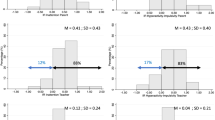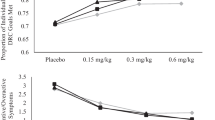Abstract
The present doubleblind study examined the effects of methylphenidate, cognitive therapy, and their combination in attention deficitdisordered (ADD) children. Four treatment groups were compared on measures of attentional deployment and cognitive style, tests of academic achievement, and behavioral rating scales. In contrast to a previous study conducted in this laboratory, children in this study were not receiving medication during posttesting. Results were interpreted to suggest that measurable effects of stimulant medication dissipate rapidly upon discontinuation of pharmacotherapy. The combination of methylphenidate and cognitive therapy was not found to be any more efficacious than either of the treatments studied alone. Discussion suggests that medication status at follow-up is an essential feature of research design.
Similar content being viewed by others
References
Abikoff, H. (1985). Efficacy of cognitive training interventions in hyperactive children: A critical review.Clinical Psychology Review, 5, 479–512.
Abikoff, H., & Gittelman, R. (1985a). Hyperactive children treated with stimulants: Is cognitive training a useful adjunct?Archives of General Psychiatry, 42, 953–961.
Abikoff, H., & Gittelman R. (1985b). The normalizing effects of methylphenidate on the classroom behvior of ADDH children.Journal of Abnormal Child Psychology, 13, 33–44.
American Psychiatric Association. (1980).Diagnostic and statistical manual of mental disorders (3rd ed.). Washington, D.C.: Author.
Baker, H. J., & Leland, B. (1967).Detroit Tests of Learning Aptitude. Indianapolis: Bobbs Merrill.
Block, J., Block, J. H., & Harrington, D. M. (1974). Some misgivings about the Matching Familiar Figures Test as a measure of reflection-impulsivity.Developmental Psychology, 10, 611–632.
Brown, R. T., Borden, K. A., & Clingerman, S. R. (1985a). Adherence to methylphenidate therapy in a pediatric population: A preliminary investigation.Psychopharmacology Bulletin, 21, 28–36.
Brown, R. T., Borden, K. A., & Clingerman, S. R. (1985b). Pharmacotherapy in ADD adolescents with special attention to multimodality treatments.Psychopharmacology Bulletin, 21, 191–211.
Brown, R. T., Borden, K. A., Spunt, A. L-, & Medenis, R. (1985). Depression following pemoline withdrawal in a hyperactive child.Clinical Pediatrics, 24, 174–175. (Letter)
Brown, R. T., & Quay, L. C. (1977). Relfection-impulsivity in normal and behavior-disordered children.Journal of Abnormal Child Psychology, 5, 457–462.
Brown, R. T., & Sleator, E. K. (1979). Methylphenidate in hyperkinetic children: Differences in dose effects on impulsive behavior.Pediatrics, 64, 408–411.
Brown, R. T., Wynne, M. E., & Medenis, R. (1985). Methylphenidate and cognitive therapy: A comparison of treatment approaches with hyperactive boys.Journal of Abnormal Child Psychology, 13, 69–87.
Cairns, E., & Cammock, T. (1978). Development of a more reliable version of the Matching Familiar Figures Test.Developmental Psychology, 18, 555–560.
Charles, L., & Schain, R. A. (1981). A four-year follow-up study of the effects of methylphenidate on the behavior and academic achievement of hyperactive children.Journal of Abnormal Child Psychology, 9, 494–505.
Conners, C. K. (1969). A teacher rating scale for use in drug studies with children.American Journal of Psychiatry, 126, 152–156.
Domascus, E. (1980).Teacher ratings of children with attentional disorders. Unpublished doctoral dissertation, University of Michigan.
Douglas, V. I. (1983). Attentional and cognitive problems. In M. Rutter (Eds.),Developmental neuropsychiatry (pp. 280–329). New York: Guilford.
Douglas, V. I., Barr, R. G., O'Neill, M. E., & Britton, B. G. (1986). Short-term effects of methylphenidate on the cognitive, learning and academic performance of children with attention deficit disorder in the laboratory and classroom,Journal of Child Pychology and Psychiatry, 27, 191–211.
Durrell, D. D. (1955).Durrell Analysis of Reading Difficulty. New York: Harcourt, Brace and World.
Firestone, P. (1982). Factors associated with children's adherence to stimulant medication.American Journal of Orthopsychiatry, 52, 447–457.
Gadow, K. D. (1984).Relative efficacy of pharmacological, behavioral, and combination treatments for enhancing for academic performance. Unpublished manuscript, State University of New York at Stony Brook.
Gadow, K. D., Torgesen, J., Greenstein, J., & Schell, R. (1986). Learning disabilities. In M. Hersen & S. E. Breuning (Eds.),Pharmacological and behavioral treatment: An integrated approach. New York: Wiley.
Gholson, B., & Beilin, H. A. (1979). A developmental model of human learning. In H. W. Reese & L. P. Lipsitt (Eds.),Advances in child development and behavior (Vol. 13, pp. 77–91). New York: Academic Press.
Gittelman, R. (1983). Hyperkinetic syndrome: Treatment issues and principles. In M. Rutter (Ed.),Developmental neuropsychiatry (pp. 437–449). New York: Guilford.
Gittelman, R. (1984).Pharmacotherapy for ADD/H adolescents. Comment. Paper presented at a workshop sponsored by the Special Populations Section, Pharmacologic and Somatic Treatments Research Branch, National Institute of Mental Health, Washington, D.C.
Hinshaw, S. P., Henker, B., & Whalen, C. K. (1984a). Self-control in hyperactive boys in angerinducing situations: Effects of cognitive-behavioral training and of methylphenidate.Journal of Abnormal Child Psychology, 12, 55–77.
Hinshaw, S. P., Henker, B., & Whalen, C. K. (1984b). Cognitive-behavioral and pharmacologic interventions for hyperactive boys: Comparative and combined effects.Journal of Consulting and Clinical Psychology, 52, 739–749.
Humphrey, L. L. (1982). Children's and teachers' perspectives on children's self-control: The development of two rating scales.Journal of Consulting and Clinical Psychology, 50, 624–633.
Jastak, J. (1980).Wide Range Achievement Test. Wilmington, Delaware: Guidance Associates.
Kagan, J. (1966). Reflection-Impulsivity: The generality and dynamics of conceptual tempo.Journal of Abnormal Psychology, 71, 17–24.
Karp, S. A., & Konstadt, N. L. (1963).Children's Embedded Figures Test. New York: Cognitive Tests.
Keogh, B. K., & Glover, A. T. (1980). The generality and durability of cognitive training effects.Exceptional Education Quarterly, 1, 75–82.
Keogh, B. K., & Margolis, J. (1976). A component analysis of attentional problems of educationally handicapped boys.Journal of Abnormal Child Psychology, 4, 349–359.
Loney, J. (1984).Is short term intervention in childhood sufficient help for ADD/H? What more do we need to know? Paper presented at a workshop sponsored by the Special Populations Section, Pharmacologic and Somatic Treatments Research Branch, National Institute of Mental Health, Washington, D.C.
Meichenbaum, D., & Goodman, J. (1971). Training impulsive children to talk to themselves: A means of developing self-control.Journal of Abnormal Psychology, 70, 117–126.
Pelham, W. E., & Murphy, H. A. (1986). Behavioral and pharmacological treatment of attention deficit and conduct disorders. In M. Hersen & S. E. Breuning (Eds.),Pharmacological and behavioral treatment: An integrative approach (pp. 108–198). New York: Wiley.
Porrino, L. J., Rapoport, J. L., Behar, D., Ismond, D. R., & Bunney, W. E. (1983). A naturalistic assessment of the motor activity of hyperactive boys.Archives of General Psychiatry, 40, 688–693.
Schleser, R., Meyers, A. W., & Cohen, R. (1981). Generalization of self-instruction: Effects of general versus specific content, active rehearsal and cognitive level.Child Development, 52, 335–340.
Sleator, E. K. (1984).Poor outcome in stimulant treated children—Ineffective drugs or noncompliance. Unpublished manuscript, University of Illinois at Urbana-Champaign.
Sleator, E. K., & von Neumann, A. W. (1974). Methylphenidate in the treatment of hyperactive children.Clinical Pediatrics, 13, 19–23.
Sprague, R. L. (1979). Assessment of intervention. In R. L. Trites (Ed.), Hyperactivity in children: Etiology, measurement, and treatment implications (pp. 217–229). Baltimore: University Park Press.
Sprague, R. L., & Berger, B. D. (1980). Drug effects on learning performance: Relevance of animal research to pediatric psychopharmacology. In R. M. Knights & D. J. Bakker (Eds.),Rehabilitation, treatment and management of learning disorders (pp. 167–183). Baltimore: University Park Press.
Stephens, R. S., Pelham, W. E., & Skinner, R. (1984). State-dependent and main effects of methylphenidate and pemoline on paired-associate learning and spelling in hyperactive children.Journal of Consulting and Clinical Psychology, 52, 104–113.
Ullmann, R. K., Sleator, E. K., & Sprague, R. L. (1984). A new rating scale for diagnosis and monitoring of ADD children.Psychopharmacology Bulletin, 20, 160–164.
Weiss, G., Kruger, E., Danielson, V., & Elman, J. (1975). Effects of long-term treatment of hyperactive children with methylphenidate.Canadian Medical Association Journal, 112, 159–165.
Whalen, C. K., Henker, B., & Hinshaw, S. P. (1985). Cognitive-behavioral therapies for hyperactive children: Premises, problems and prospects.Journal of Abnormal Child Psychology, 13, 391–410.
Wynne, M. E. (1979).Time estimation as a measure of impulsivity in emotionally disturbed adolescent females. Unpublished doctoral dissertation, University of Michigan.
Author information
Authors and Affiliations
Additional information
This research was supported in full by U.S. Public Health Service Grant No. MH 37-628 from the National Institute of Mental Health, Psychopharmacology Branch, and by Biomedical Research Award No. RR 0715807 from the National Institutes of Health, each awarded to R. T. Brown. Placebo and methylphenidate were supplied by CIBA-GEIGY, Summit, New Jersey. The authors are grateful to Dr. Rute Medenis and the entire staff at the University of Illinois Pediatrics Clinic for their valuable assistance and kind support throughout the project. The authors would also like to thank Avery L. Spunt, R.Ph., College of Pharmacy, University of Illinois, for his assistance in packaging the medication and monitoring compliance; Arthur I. Neyhus, Ph.D., Coordinator of Child Study Facility, University of Illinois at Chicago, for his assistance in evaluation; and J. Scott Allen, Jimmy Bruce, Robert Miller, Michael Mazius, and Steven Orenczuk, for their assistance in training of the children.
The contributions of these authors are equal.
Rights and permissions
About this article
Cite this article
Brown, R.T., Borden, K.A., Wynne, M.E. et al. Methylphenidate and cognitive therapy with add children: A methodological reconsideration. J Abnorm Child Psychol 14, 481–497 (1986). https://doi.org/10.1007/BF01260518
Revised:
Issue Date:
DOI: https://doi.org/10.1007/BF01260518




